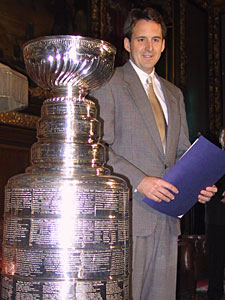|
Audio
Photos
Your Voice
|
Lawmakers getting close to special session
May 13, 2003
Gov. Tim Pawlenty says he'll call state lawmakers back for a special session immediately if they don't reach agreement on a state budget by next Monday. Pawlenty and House Speaker Steve Sviggum, R-Kenyon, say they're concerned that there won't be enough time to finish all of their work even if an overall budget framework is agreed upon soon. They say they need to give conference committees ample time to negotiate their differences and for the revisors office to process paperwork.
St. Paul, Minn. — Pawlenty says he's growing more concerned that the House and Senate are still far apart on an overall budget deal. Appearing at a news conference with pro hockey's holy grail, the Stanley Cup, Pawlenty said time was running out for them to get their work done on time.
"Overtime in hockey is OK, but overtime at the Legislature on the taxpayer's dime is not," Pawlenty said. "There's been a troubling pattern in recent years of special sessions and different reasons for that but I am concerned about the increasing likelihood of a special session. The inability of the Legislature to get their work done and get agreement."
Pawlenty says he's prepared to immediately call lawmakers back for a special session if they don't reach agreement by midnight Monday.
The House and Senate are about $1 billion apart on a budget deal. The Senate passed a bill Tuesday that raises taxes in three areas. Statewide property taxes on businesses would go up. The top 5 percent of wage earners would get an income tax hike. And cigarette taxes would increase a dollar a pack. Senate DFLers would also make some cuts, use one time money and shift payments.
Senate Majority Leader John Hottinger, DFL-Mankato, says he thinks lawmakers can finish their work even if an overall agreement isn't reached until Friday morning. He says he hopes Pawlenty and House Republicans will start warming to the Senate proposal.
"Every day that it gets stronger that Minnesotans agree with us, a balanced approach is the best approach," Hottinger said. "Four governors agree with us, former finance commissioners agree with us, editorial writers agree with us and most important the ten thousand people we've talked to in town meetings across this state agreed with us. So we're energized not by this vote but by the support we're receiving by the people of Minnesota."
But House Republicans and Governor Pawlenty don't agree with Hottinger. They both say they won't pass a tax increase.
The House plan balances the budget by making deeper cuts, shifting some payments and using one time money. They also say installing two thousand slot machines at Canterbury Park will generate $100 million in additional revenue.
House Speaker Steve Sviggum, R-Kenyon, says his caucus won't budge on a tax increase even if the Legislature goes to a special session. Sviggum also disagrees with Hottinger's assessment that they can reach agreement on overall targets and finish their work by Monday night.
"It takes a certain turn around time and just because you get an agreement on a global level does not mean that the conference committees will be able to do their work in a day," Sviggum said. "Some of the decisions are very great. Not only numbers but the policy differences are great. So there's no saying that they're going to have significant change, significant agreement in a matter of a few hours in a conference committee either."
Sviggum says he's working to try to find extra revenues to get Senate Democrats to approve the House plan. He says, however, there's isn't much one time money laying around and any more payment shifts will hurt the state's credit rating.
There's also the problem of processing all of the bills once they're approved in conference committee. Michele Timmons, revisor of statutes for the state, says her office won't be able to process legislation if conference committees don't have an agreement reached early in the weekend.
"With very large bills, such as an 800-page health and human services bill, a 400-page tax bill, it will become very difficult to produce all of that new law for the Legislature if we don't have good decisions and closure by sometime over the weekend," Timmons said.
Timmons says Internet publishing alleviates some of the pressure of printing the bills for lawmakers. She says, however, that a large part of her office's work focuses on making appropriate changes to committee reports and do reference checks before the bills are sent to the House and Senate.
|
News Headlines
|
Related Subjects
|

